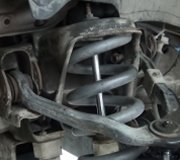Noises travel so while it can sound like it's coming from the rear, the front bearings are more likely suspects. As for getting a clue from turning, as in changing lanes at highway speeds, that works real well on older cars with pressed-in wheel bearings. If the noise gets louder when turning left, it is the right bearing. More weight shifts to it and makes it louder. Turning the other way often makes the noise completely go away.
You can't rely on that trick with bolted-on bearing assemblies. They can sound like the noise is coming from the left side, they can get louder when turning right, and end up being the right one that's bad. I've been fooled too many times. The only sure way I've found to identify those is by listening next to each one with a stethoscope while running it in gear on a hoist.
You have those pressed-in bearings on the front so if turning doesn't affect the noise, it could indeed be a noisy rear bearing. The rear ones are the assemblies that typically don't change sound when turning.
There is a tool you might be able to borrow or rent from an auto parts store that borrows them called the "Chassis Ear". It is a set of six microphones, a switch box, and headphones. You clip the microphones to suspect points, then drive around while listening with the headphones. You can move the microphones around to zero in on the source of the noise. Be aware that many mechanics have never seen or even heard of this tool. Suspension and alignment mechanics use it to find rattles, squeaks, and other noises.
Wednesday, November 14th, 2012 AT 4:57 AM


